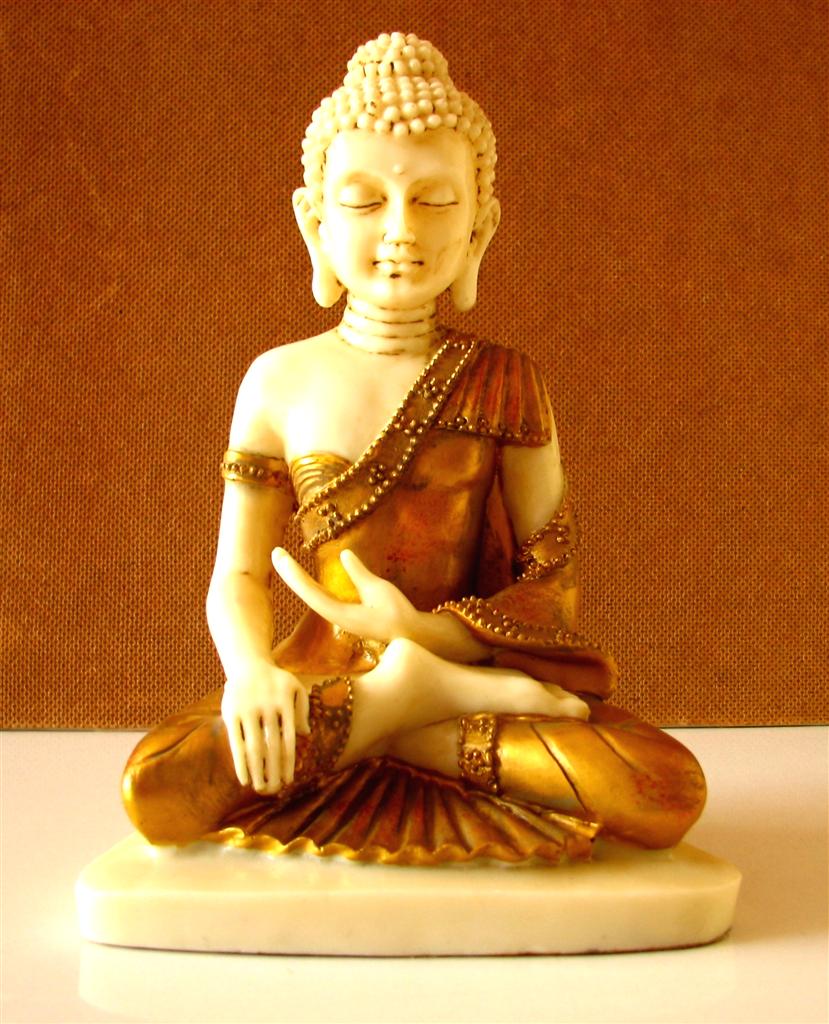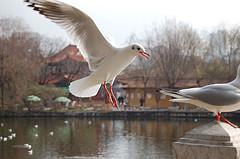| Jan 9, 2008 12:11 | |
 | it's a broad topic coz Sun's thoughts are not limited to military affairs. pick up one piece saying that''Attack where they are not prepared, go out to where they do not expect', meaning attack where the enemy is not at full strenght, concentrate on ereas where the opposites do not expect us to attack,use full force to strike the most vulnerable points...this theory being extened to business world can be explianed that bold enough to act reversely against herd behavior, catching the busi. opp before competitors realize them, stepping into mkt before it is in full swing, focusing on business operation core...hope my words could trigger more disscussions in depth. |
| Jan 20, 2008 21:30 | |
 | Sun Tzu' military ideas in the book "Art of War" are profound. Chairman Mao has learnt the military ideas well. He adopted the military ideas to direct wars in the Civil War and Liberation War. He combined Sun's ideas with the special situation in the severe civil wars. |
| Jan 24, 2008 21:22 | |
 | Mao Zedong has a good command of the essence of " Art of War". He used the tactic that ''Attack where they are not prepared, go out to where they do not expect" very successfully in the Liberation War. He was very talented in military. |
| Jan 25, 2008 08:59 | |
 | ''Mao Zedong has a good command of the essence of " Art of War". He used the tactic that ''Attack where they are not prepared, go out to where they do not expect" very successfully in the Liberation War. He was very talented in military.'' summersnow, i have little idea of Chairman Mao coz i did not grow up in his Dynasty. However, I am queastioning Mao's talents in ART OF WAR after i finished reading the abstracted article below. Mao Zedong (1893-1976) Chinese Revolutionary Mao Zedong, also known as Mao Tse-tung, established the Chinese Communist Party, militarily took over the most populous country in the world, and inspired Communist movements in scores of other countries. Through both his direct actions and widespread distribution of his ideas through his writings, Mao established himself as a preeminent Communist and one of the most influential politico-military leaders of the twentieth century. Although he made his career representing the poor, Mao began life in 1893 as a member of a well-to-do peasant-class family who had acquired both land and a business in the village of Shaoshan in Hunan Province. As a result, Mao had a comfortable childhood and opportunities for an advanced education. He studied world military and political history, including the accomplishments of George Washington, Napoleon I, Peter the Great, and his fellow countryman Sun Tzu. Mao served briefly during 1911-12 with the revolutionary forces that defeated the Ching dynasty, seeing little combat as an orderly in a local militia unit but learning much about military life. After the revolt concluded, Mao returned to school, where he worked as a library assistant at Peking University in 1918-19 and studied Marx and Engels and other advocates of socialism and communism. At the end of his university tenure, he began publishing his own thoughts on how Marxism could revitalize China. In 1921, Mao went back to Hunan Province as a teacher and supporter of mass education. When his ideas met resistance from local leaders, Mao became more involved in politics. On July 1, 1921, he joined eleven fellow Marxists in Shanghai to form the Chinese Communist Party (CCP). In 1923 the CCP merged with the Nationalist Party of Kuomintang (KMT), which shared its ideas of people empowerment. The Communists had little respect for the KMT and its leader, Chiang Kai-Shek, but Mao never avoided forming short-term alliances with whoever might assist him in achieving his ultimate, long-term objectives. |
| Jan 25, 2008 09:06 | |
 | The CCP-KMT partnership disintegrated in 1927 when it became apparent the Mao and Chiang held different views on Soviet interests in China. With Mao encouraging USSR support and Chiang opposing, it, the two leaders began their competition for the domination of China. Whereas Mao and his Communists concentrated on the rural regions and peasant villages, where the real power of China lay, the KMT and Chiang operated in the urban centers and controlled the industrial areas. Mao formed the Red Army, and his followers elected him chairman of the Chinese Soviet Republic, formed in 1931. Based on his study of great conquerors of earlier ages - with Sun Tzu as his primary model - Mao set as his first priority maintaining an army in the field. He saw revolutionary warfare against the stronger, established state as a protracted conflict with would take years to win. His Red Army would have to gain political support from the peasants and militarily control the countryside before approaching the population centers. Following the axioms of Sun Tzu, the Red Army attacked when strong and retreated when weak. Mao implemented his strategy when Chiang moved his stronger army against the Red Army in four separate offensives. Each time, Mao retreated rather than become decisively engaged. Then, in 1934, Mao was surrounded by Chiang's forces, and only a bold breakout prevented the destruction of his army. |
| Jan 25, 2008 09:07 | |
 | For a year, the Red Army fought and retreated westward to Siikiang Province and then north to the Communist stronghold in remote Shensi. By the end of the six thousand-mile march, the co-called Long March, only twenty thousand of Mao's original one hundred thousand followers remained. The survivors, though, were experienced, hardened, and dedicated to Mao and the CCP. Moreover, along the march's route, Mao had left behind small "cells," or groups, of loyal comrades with whom he would later build political and military support. In 1937, Mao and Chiang subordinated their differences to unite against an invasion from Japan. Mao remained in the rural northern provinces conducting mostly guerrilla warfare against the Japanese and solidifying his reputation from protecting the peasants in the countryside as he stockpiled weapons and arms from the Soviets and their allies. His army prospered. Meanwhile, Chiang faced larger Japanese forces in the urban areas of the south, which weakened his army. Immediately after the end of World War II, the Nationalists and Communists resumed internal fighting for control of China. Mao, now with the stronger force, began an offensive and, through a series of battles, pushed the Nationalists into smaller and smaller areas. Finally, in 1949, Chiang and a few followers withdrew to Formosa and formed Nationalist China. On October 20, 1949, Mao proclaimed the People's Republic of China and accepted election as chairman. Now completely controlling the most populous country on earth, Mao moved ruthlessly against landowners and all others who opposed him. So totalitarian was Mao's rule that he executed or starved to death more than 20 million of his countrymen over the next two decades in order to bring them the "joys" and "advantages" of Communism. |
| Jan 25, 2008 09:08 | |
 | Except for authorizing massive support in weapons and "volunteer" divisions for North Korea in the early 1950s, Mao took little further direct part in military operations. Although he continued to dominate the military, as he did every other aspect of Chinese life, his primary focus was now on the political realm. Within China, Mao instituted various "revolutions" to advance his ideas. Outside China he dispatched military and civilian agents to spread his brand of communism around the world. Ho Chi Minh and Vo Nguyen Giap in Indochina, Kim Il Sung in Korea, Fidel Castro in Cuba, Pol Pot in Cambodia, students on American campuses during the 1960s, and other revolutionists around the world studied the teaching of Mao. His "little Red Book," Quotations of Chairman Mao, became the Bible of his country and the revolutionary primer for discontents around the globe. Mao never hesitated to use his army to put down any opposition within China, and during his tenure his military milled far more Chinese than external enemies. His rule from 1949 until his death at age eighty-three in Beijing on September 9, 1976, remained as strong and complete, and mostly corrupt, as that of any government in the world. On the surface, it would appear that Mao Zedong made an indelible mark by gaining and wielding control over the world's most populated country. But for all his emphasis on long-term strategy, Mao practiced a political philosophy vulnerable to changing world events. Though China continues to operate under a Communist regime, it is not Mao's model of Communism; indeed, his successors have attempted to exorcise Mao. Many other communist countries Mao supported have declined or collapsed altogether. Readers of his Little Red Book are nowhere in power. |
| Jan 25, 2008 09:08 | |
 | Despite these reasons, or perhaps because of them, Mao would rank much higher if this list focused on political rather than military influence. Mao's power came much more from his political strength than from any prowess as a military leader. In fact, his greatest accomplishment, which led to his ultimate takeover of China, was the ability to survive during long and difficult times. Once Mao assumed power, most of his military influence involved the harassment and killing of his own people. Except for supporting North Korea with troops in the early 1950s, helping North Vietnam with arms and supplies in the 1960s and early 1970s, and skirmishing with various weak neighbors, Mao's China exerted little conventional military power outside its own borders. In the twenty short years since his death, Mao's overall status as an influential figure in modern history has fallen, and his military reputation has diminished to that of just another ruthless former totalitarian head of state. In the next century, Mao as a military leader may rate no more than a footnote as his influence continues to decline. |
Post a Reply to: Chinese militarist-Sun Tzu







 Copyright © 1998-2026 All rights reserved.
Copyright © 1998-2026 All rights reserved.